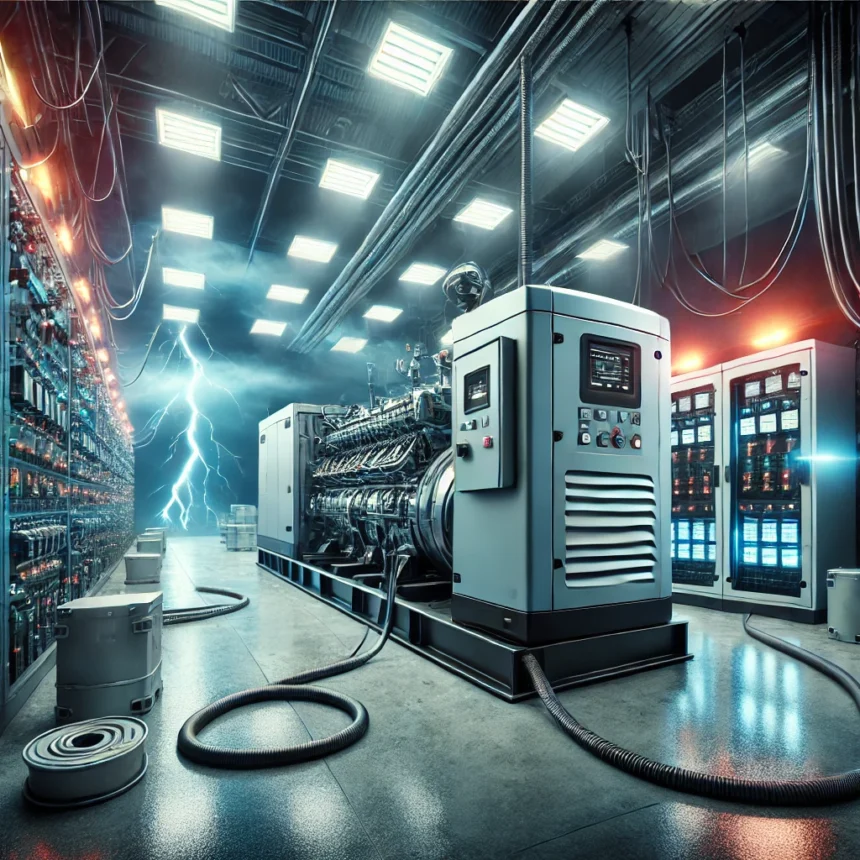Introduction:
In times of crisis, the reliability of critical infrastructure becomes a matter of life and death. Whether it’s a natural disaster, a power grid failure, or an unforeseen technological mishap, having robust backup solutions ensures that essential services remain operational. Hospitals, communication networks, data centers, and emergency response units rely heavily on uninterrupted power to deliver their services effectively.
Among the many power solutions available, diesel generators are the most dependable. These machines are designed to provide stable energy under the most challenging conditions. Their resilience and efficiency make them indispensable for critical infrastructure. This article delves into how diesel generators ensure stability during crises, their key features, and best practices for maintaining them for optimal performance.
Understanding the Importance of Reliable Backup Power:
Why Backup Power is Crucial in Crisis:
Critical infrastructure cannot afford to fail during emergencies. Facilities like hospitals, for example, rely on uninterrupted power to keep life-saving equipment running. A delay of even a few seconds in restoring power could have catastrophic consequences.
Moreover, communication systems are vital for coordinating rescue and relief efforts. Diesel generators play an essential role here, ensuring uninterrupted power supply so that emergency responders can stay connected and act swiftly.
Diesel Generators as a Reliable Solution:
Diesel generators are widely regarded as the gold standard for backup power. Their reliability and efficiency make them suitable for long-term and short-term crises. Unlike renewable energy sources, which are weather-dependent, diesel generators provide consistent power regardless of external conditions.
With advanced features like automatic load balancing and remote monitoring, modern diesel generators offer seamless integration into critical systems. Businesses and organizations looking for durable and efficient solutions often explore Diesel Generators for Sale, ensuring they have the best equipment to meet their needs.
Key Features of Diesel Generators for Critical Infrastructure:
Durability and Longevity:
One of the standout features of diesel generators is their robust construction. Built to endure harsh environments, they are less prone to wear and tear compared to other generator types. This makes them particularly suitable for high-stress situations where continuous operation is required.
Their longevity also translates to cost savings. With proper maintenance, diesel generators can operate efficiently for years, making them a worthwhile investment for critical infrastructure.
High Efficiency and Fuel Economy:
Diesel generators are known for their exceptional fuel efficiency. They consume less fuel compared to gasoline-powered alternatives while producing more power. This efficiency is crucial during crises when fuel availability may be limited.
Additionally, modern diesel generators come equipped with advanced systems that optimize fuel usage. This not only reduces operational costs but also minimizes environmental impact, making them a sustainable choice for critical applications.
Best Practices for Using Diesel Generators in Emergencies:
Regular Maintenance and Testing:
Routine maintenance is essential to ensure that diesel generators are always ready to perform in emergencies. Scheduled inspections help identify potential issues before they escalate, reducing the risk of unexpected failures during a crisis.
Key maintenance practices include:
- Checking fuel levels and ensuring proper storage conditions.
- Inspecting and replacing worn-out parts, such as filters and belts.
- Testing the generator under load to verify its performance.
Proper Installation and Load Management:
Installing diesel generators correctly is vital for their performance. Poor installation can lead to inefficiencies or even equipment damage. It’s crucial to follow manufacturer guidelines and work with experienced professionals during the setup process.
Load management is equally important. Overloading a generator can lead to malfunctions, while underloading may cause inefficient fuel use. Implementing a balanced load ensures optimal performance and longevity.
Applications of Diesel Generators in Crisis Situations:
Supporting Healthcare Facilities:
Hospitals and medical centers rely on continuous power to maintain life-support systems, refrigeration for medications, and surgical equipment. Diesel generators ensure these facilities can function seamlessly, even during prolonged power outages.
In addition, they provide power for mobile medical units deployed to disaster-stricken areas. These units require reliable energy sources to operate in remote locations without access to the main grid.
Enabling Emergency Communication Networks:
During crises, communication networks are often the first to be affected by power failures. Diesel generators play a critical role in powering telecommunication towers and data centers, ensuring that emergency responders and the public can stay informed.
Backup power for communication systems also supports the operation of emergency alert systems, which are crucial for public safety during disasters.
Enhancing Efficiency Through Advanced Generator Technology:
Remote Monitoring and Control:
Modern diesel generators come equipped with remote monitoring capabilities, allowing operators to track performance metrics in real time. This technology ensures that potential issues can be identified and addressed quickly, minimizing downtime during emergencies.
Remote control systems also allow for seamless adjustments to generator settings, optimizing performance based on current requirements. This flexibility is invaluable in dynamic crisis situations.
Integration with Renewable Energy Systems:
While diesel generators are reliable standalone solutions, they can also be integrated with renewable energy systems to enhance efficiency. For instance, during non-emergency periods, solar panels or wind turbines can handle the primary load, with the diesel generator serving as a backup.
This hybrid approach reduces fuel consumption and environmental impact while ensuring uninterrupted power supply when renewable sources are insufficient.
Future Trends in Diesel Generator Technology:
Eco-Friendly Innovations:
As environmental concerns continue to rise, manufacturers are developing cleaner and more efficient diesel generators. These innovations include advanced emission control technologies and the use of biofuels, which reduce the carbon footprint of generator operations.
Investing in eco-friendly diesel generators ensures compliance with environmental regulations while maintaining reliable performance in critical applications.
Smart Grid Integration:
The integration of diesel generators with smart grid systems is another emerging trend. This allows for automated demand response, where generators activate only when necessary, reducing energy waste and operational costs.
Smart grid compatibility also facilitates better resource allocation during crises, ensuring that power is directed to the areas that need it most.
Conclusion:
In crisis situations, reliable power solutions are non-negotiable. Diesel generators stand out as the backbone of critical infrastructure, providing consistent and efficient energy when it matters most. Their durability, fuel efficiency, and advanced features make them indispensable for industries ranging from healthcare to telecommunications.
For organizations seeking robust backup power solutions, exploring Diesel generators ensures access to high-quality equipment tailored to meet diverse needs. By adopting best practices for maintenance and embracing technological advancements, diesel generators can continue to power critical infrastructure effectively, safeguarding lives and supporting recovery efforts during crises.










 /home/u448362301/domains/theexpotab.com/public_html/wp-content/themes/foxiz/templates/popup.php on line 167
/home/u448362301/domains/theexpotab.com/public_html/wp-content/themes/foxiz/templates/popup.php on line 167